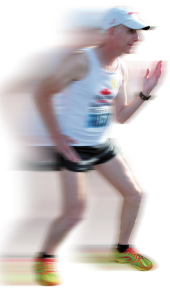Going the distance, what it takes
By Lookout on Jun 29, 2015 with Comments 0

MS Mark Ritchie
Master Seaman Mark Ritchie braces himself for the echoing boom of the Navy Run start signal.
He holds his body taut, left foot pointed in front of him, knees slightly bent.
Around him are hundreds of runners frozen in similar stances.
He focuses on breathing.
Running through his mind is the 10 kilometre course, every turn and hill well studied and memorized beforehand.
During the past 30 years, the sailor has been a fixture at the start line of hundreds of races.
In any given year he will run between five to 20 races.
“I started off on the high school track team in Grade 11,” he said before the race.
“But when school was over, there was no more track team, and I started racing on my own.”
A few years later, in 1997, he joined the Army Reserve in Hamilton, ON, as a Diesel Mechanic.
When he wasn’t working, he was running all over the Ontario landscape, training and competing.
“There’s the attraction of being better every time you do another race, to see yourself improve,” he says.
His main goal is always to run faster than his previous time.
He says a big component of achieving that is his familiarity with his own running ability.
“You have to run at a precise pace, and maintain that pace from start to finish so you don’t crash half way through,” he says.
“And you have to be aware of your endurance level throughout.”
After moving to Victoria in 1999, and joining the Regular Force Navy, he found the temperate climate allowed him year round racing.
By 2012, he was running 10,000 metre races on the University of Victoria track with local elite runners.
He also ran the entirety of the Galloping Goose Trail, a 56-kilometre, 4.5 hour run.
He is familiar with the Navy Run, and the 10k route that winds through the streets of Esquimalt, having run it in years past.
As the 5th (BC) Field Royal Canadian Artillery gun fires, marking the race start, MS Ritchie springs forward, and is quickly swept up in the sea of runners.
As an experienced athlete, he soon leaves the pack behind.
He crosses the finish line in 38 minutes and 28 seconds earning a second place finish in his age category.
“My qualifying times in other races, including my Navy Run times in past years, enabled me to apply for and enter the (military) Running Nationals,” he says.
Each May, 20 military personnel from each region are sent to Ottawa for the CAF Running Nationals.
MS Ritchie has qualified and raced in Ottawa six of the past eight years.
“My training leading up to a race takes the form of running five or six days a week,” he says.
“Depending on the race I’m training for, and how close I am to running it, will determine the intensity of each run.”
For a shorter five or 10 kilometre race, MS Ritchie will run anywhere from 30 minutes to two hours per training session.
But if he’s preparing for a 42 kilometre marathon, he could build up to 3.5 hours per workout, beginning three months ahead of the scheduled marathon day.
The night before a race, he loads up on carbohydrates.
On the morning of a race, MS Ritchie follows a strict routine, waking up exactly three hours beforehand, sipping water and eating nothing more than a banana and a bagel.
Occasionally, he will forego food entirely, relying on the energy stores built the previous day.
“As I’m running, I’m focusing on my pace, my breathing, and my form,” he says.
“I’ll look for the smooth road surface, and gauge my distance around corners. I’ll also watch myself carefully as I move up hills, and sometimes tuck behind a group to slipstream.”
He admits that by mid-course pain can be a challenge.
“A few years ago, at the Ottawa Marathon, I had a really rough time in the middle of the run. But I just kept putting one foot in front of the other to keep moving forward – to get to that finish line.”
The Navy Run, he says, has proven to be a particularly challenging course, with multiple steep inclines.
“I’ll turn it up, and when I see that finish line, I’ll end strong. When you cross that line, you’re breathing heavily, and there’s a transition from being 100 percent switched on, to feeling normal again.”
MS Ritchie attributes the military’s encouragement of physical fitness to be a key factor in his success.
“There’s something about the support that I get from my unit, and on a larger scale, the whole base – up through all of the ranks – that is so valuable in supporting my fitness and training,” he says.
“I plan on running forever. I have no plans to stop.”
Rachel Lallouz
Staff Writer
Filed Under: Top Stories
About the Author:





